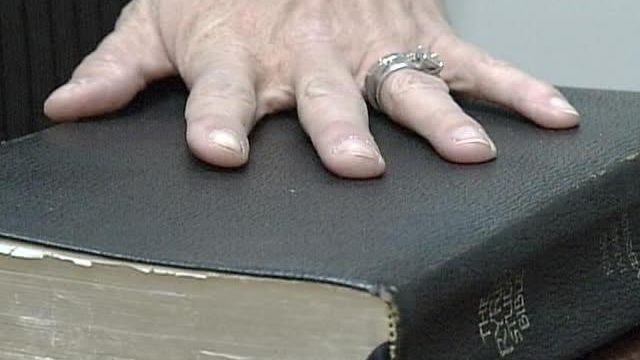Judge Rules in ACLU's Favor on Religious Texts in Court
A Wake County judge ruled Thursday that any religious text can be used to swear in a witness or juror in the state's courtrooms, not just the Bible.
Posted — UpdatedThe American Civil Liberties Union argued a law that some judges said required the state's courts to use the Bible alone is unconstitutional because it favors Christianity over other religions.
The ACLU sought a court order clarifying that the law is broad enough to allow the use of multiple religious texts, or else declare the statute unconstitutional.
Wake County Superior Court Judge Paul Ridgeway ruled that a witness or juror can take a court oath using a text "most sacred and obligatory upon their conscience," citing common law and precedent of the state Supreme Court.
The judge didn't declare the law unconstitutional or rule on whether the term "Holy Scriptures" could be reasonably interpreted to mean any sacred text other than the Bible. But the ACLU still considered the ruling favorable.
"The judge's ruling today makes it clear people of faith will be treated equally in our courtrooms," said ACLU executive director Jennifer Rudinger.
"As of today all people can use the holy text of their choice," said Seth Cohen, an ACLU attorney who argued the case. "We think it's a great victory."
Others are not pleased with the judge's decision.
"That's not unifying. That's breaking us up into factions," said Mark Creech, of the Christian Action League.
State law allows witnesses preparing to testify in court to take their oath in three ways: by laying a hand over "the Holy Scriptures," by saying "so help me God" without the use of a religious book, or by an affirmation using no religious symbols.
A trial court judge initially dismissed the ACLU's lawsuit in December 2005, ruling it was moot because there was no actual controversy at that time warranting litigation.
In January, the ruling was reversed by an unanimous three-judge panel of the state Court of Appeals, after the ACLU had added Syidah Mateen as a plaintiff. In its decision, the appeals court cited Mateen's claim that her request to place her hand on the Quran as a witness in a domestic violence case in Guilford County was denied in 2003.
Before the ACLU filed its lawsuit, the group and the Washington-based Council on American-Islamic Relations had asked the state's court system to allow use of the Quran and other religious texts in courtrooms. The director of the state court system refused, saying the General Assembly or the courts needed to settle the issue.
During a court hearing earlier this month, the state Attorney General's Office asked Ridgeway to dismiss the case because the complaint was political.
But the ACLU argued that an 1856 state Supreme Court decision set a clear precedent for oaths with religious texts and noted a change to the law made in 1985.
Before that time, the law was called "Administration of oath upon the Gospels" and stated that someone to be sworn was to lay a hand on "the Holy Evangelists of Almighty God." Legislators took out "the Gospels" in the title and changed the language to simply read "Holy Scriptures" in 1985.
The court decision Thursday noted that North Carolina's oath-taking statutes were written for Christians but do not limit others from swearing in the way they deem most sacred.
The state has 30 days to appeal the ruling.
• Credits
Copyright 2024 by WRAL.com and the Associated Press. All rights reserved. This material may not be published, broadcast, rewritten or redistributed.






